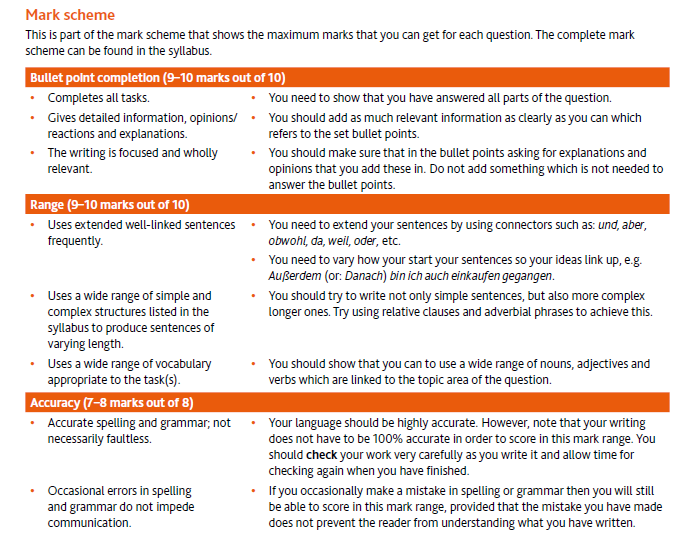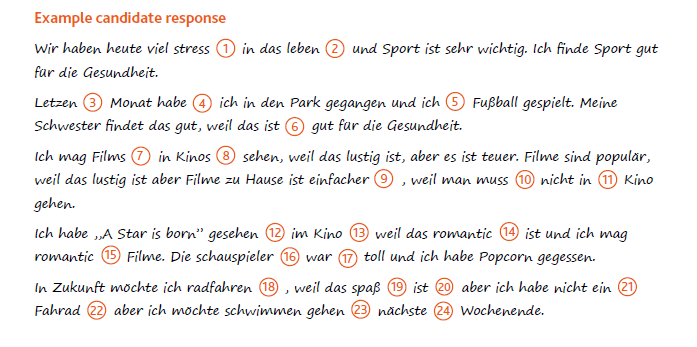Section outline
-
-
Example candidate response
-
All information and advice in this section is specific to the example question and response being demonstrated. It should give you an idea of how your responses might be viewed by an examiner but it is not a list of what to do in all questions. In your own examination, you will need to pay careful attention to what each question is asking you to do.
-

-
Markscheme

-
Example candidate response

-
Common mistakesGeneral adviceThese are some of the most common mistakes made by candidates when answering this type of question:
- Candidates do not read the question carefully.
- Candidates do not pay close attention to the question words and, as a consequence, their answers contain irrelevant material.
- Some candidates tend to ignore little words such as neulich which can change the meaning, i.e. they may describe an event several/many years ago.
- Candidates do not think carefully about the tenses required to answer each task.
- Candidates do not make a plan and sometimes write irrelevant material which is too general or which is not relevant to the set tasks. For example, if asked to describe a film you have watched recently, some candidates may include other details such as what they ate and drank in the cinema.
- Answers are often longer than the advised length of 130–140 words. (Very long answers tend to include inaccuracies and irrelevant material).
- Some sentences are short and are not joined by linking words. They could be made more complex by linking them better.
- Spellings are not always checked very carefully by candidates.
- Candidates frequently do not make the correct case agreements (for articles, nouns and adjectives).
- Common verbs are often incorrectly conjugated and the message can become confused.
- Nouns are often written without a capital letter.
- Candidates often forget to consider the right German word order (verb position).
In order to answer this kind of question well:
- Read both questions 3(a) and 3(b) and choose the one with the set tasks that you can say most about in German.
- Look out for little words like gern, nicht or neulich so you don’t accidentally miss anything or even say something which contradicts the information in the bullet points.
- Circle the key words in the question to make sure you include all details. Perhaps tick off each detail on the question paper as you write about each one.
- Use the bullet points in the question to plan your answer. Put useful verbs next to each bullet point.
- Think about which tense you need to use to answer each bullet point. The verbs and time adverbs will help you. Write the tense next to the task to remind you.
- Think about who you are being asked to write about: yourself (ich) or yourself with a group of people (wir), one other person (er/sie) or a group of people (sie).
- Make a quick list of structures you want to include (e.g. um...zu + infinitive, nicht nur......sondern auch...., wenn + conditional tense). Try to use these structures in your answer.
- Look to see if there is any word or short phrase in the question which you could include in your answer, e.g. ‘zum Abendessen’, which could form part of your sentence. Also, ‘in Ihrer Freizeit’ could be changed to ‘in meiner Freizeit’ in your answer.
- Plan your answer very carefully so that you try to write a short paragraph on each task/bullet. Leave a line between each paragraph.
- Think about what is being asked of you in the question. Ask yourself whether you are being asked to give facts, describe something, give an opinion or even a reason.
- If a task has two parts such as 'Say which food you prefer and explain why' make sure you include an explanation (why).
- When you have finished your answer, re-read your work carefully to check all the language for accuracy. Do several checks.
- Take great care with all spellings which you know you often have trouble with (e.g. letzte(s), nächste(s)).
- Always put in reasons for feelings and opinions and try to develop your answer by adding in supporting, relevant detail.
- Try to make longer sequences of language by joining sentences and phrases together. Learn a variety of joining words such as weil, denn, da, obwohl, trotzdem, deswegen, etc.
- Check the perfect tenses you use and do not miss out the correct part of the auxiliary verb (haben or sein).
- If you use two verbs together make sure the second one is in the infinitive and think about the word order (e.g. Ich darf am Wochenende ins Kino gehen).
- Check all the spellings of nouns and adjectives and make sure all nouns begin with a capital letter.
- Make sure you write as clearly and neatly as possible. If you want to cross anything out just put one line through the material you do not want the examiner to consider.
-
Download the full learner guide to explore the Example Candidate Response further, including the examiners comments:
-
